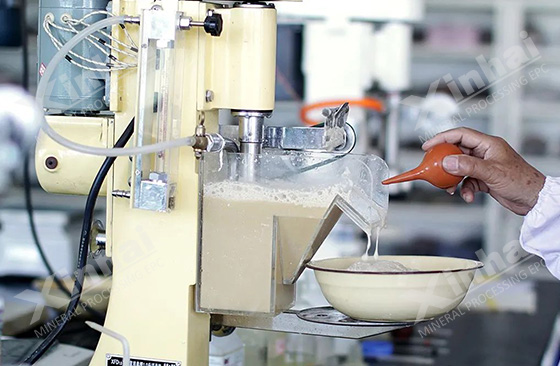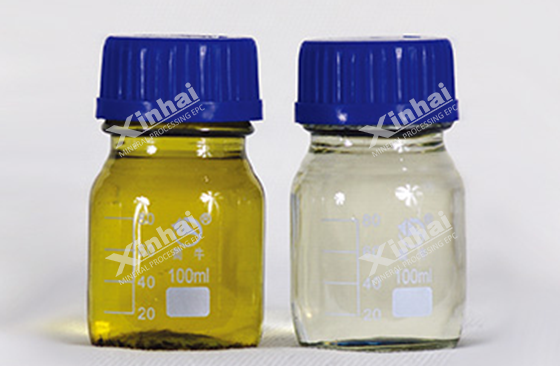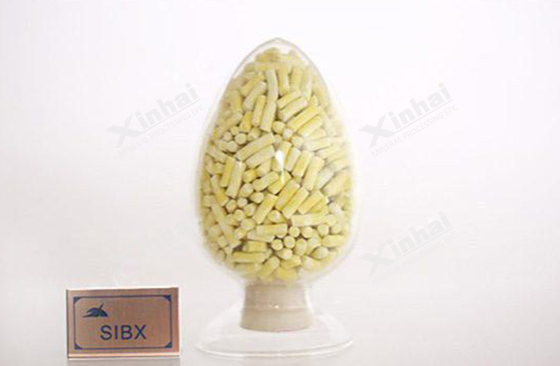
When carrying out the flotation process of ore, a certain dose of flotation reagent needs to be added to improve the flotation efficiency. Commonly used flotation reagents include collectors, frothers and regulators. These reagents change the surface properties of ores and impurities through adsorption, chemical reactions or other methods, and present different flotation behaviors in the slurry. The choice of flotation reagents It will directly affect the efficiency and selectivity of the flotation process. A reasonable pharmaceutical system can improve the recovery rate of ore, reduce production costs and reduce environmental pollution. Determining the dosage, ratio and addition method of chemicals can ensure the ideal flotation effect. Therefore, comprehensively considering the nature of the ore, flotation conditions and production goals, scientific design and use of flotation reagents are key factors to ensure the smooth progress of the flotation process and the ideal flotation effect. The following will introduce you to the types of flotation reagents and how these chemicals affect flotation efficiency.

1. Collecting agent: an agent that can interact with the mineral surface and reduce the wettability of the mineral surface, thereby improving the floatability.
2. Foaming agent: Foam is the medium that floats mineral particles during flotation. The foam with mineral particles attached to the air-water interface is called three-phase foam or mineralized foam.
3. Adjusters: divided into three categories according to their main functions.
A. inhibitor: mainly to reduce the floatability of minerals. On the one hand, inhibitors can form a hydrophilic film on the mineral surface to prevent the collector from interacting with the mineral surface. Inhibitors on the other hand can dissolve the collector film from the mineral surface or the active film that contributes to the collector's action. Inhibitors can also reduce the concentration of active ions in the solution, making it difficult for the collector film to form.
B. Activator: Activator can change the mineral surface into a state that is easy to absorb the collector. In production practice, some minerals cannot directly adsorb collectors, and activators are often added to change the surface activity of the minerals, making them conducive to the adsorption of collectors. Commonly used activators are heavy metal salts.
C. Medium regulator: its main function is to adjust the pH value of the slurry, adjust the effects of other chemicals, eliminate the impact of harmful ions on flotation and adjust the dispersion and aggregation of the slurry. The pH of the slurry often directly or indirectly affects the floatability of the minerals in it. Certain active ions or molecules in the agent can act on the mineral surface, thereby changing the pH value of the slurry.
The main basis for the classification of the above-mentioned chemicals is their main role in the flotation process. The flotation process should take into account interactions between agents. The result of actual mineral flotation is the comprehensive effect of various flotation reagents, so it is necessary to comprehensively utilize various mineral processing reagents.

Flotation reagents have an important impact on the flotation process, mainly reflected in the following aspects:
1. Agent selectivity: Different types of flotation agents have different adsorption properties for different minerals, so they can achieve selective adsorption of the target mineral and make it float without significant impact on the waste rock.
2. Flotation speed: Appropriate flotation reagents can accelerate the contact and adsorption of target minerals and bubbles, thereby increasing the flotation speed, reducing flotation time, and improving production efficiency.
3. Agent concentration: Too low a agent concentration may not cover the mineral surface, affecting the flotation effect; too high a agent concentration may lead to a waste of agents and environmental pollution.
4. pH value control: By adjusting the pH value of the slurry, the electrical properties of the mineral surface can be changed, thereby affecting the adsorption behavior of the agent and the mineral surface, thereby affecting the flotation effect.
In general, flotation reagents play a vital role in the flotation process. Their selection, dosage and control need to be reasonably designed and adjusted according to the specific ore characteristics and flotation requirements to achieve the best flotation effect.

The impact of reagent configuration on flotation involves many aspects.
1. The type and ratio of reagents will directly affect the flotation selectivity. Different types of reagents have different degrees of affinity for different minerals, so the ratio needs to be adjusted according to the composition and mineral properties of the ore to improve the flotation efficiency of the target mineral.
2. The amount of reagents added will affect the contact probability between bubbles and solid particles in the flotation tank. Excessive reagents will produce excess foam or cause waste of reagents. Insufficient reagents will result in the inability to fully recover useful minerals.
3. The adding method and time of the reagent will also affect the reagent configuration. It is necessary to consider whether the method needs to be pre-mixed or added gradually, and whether the dosage of the reagent needs to be adjusted during the flotation process, which will have an impact on the flotation effect.
The adjustment of the reagent configuration needs to comprehensively consider the properties of the ore, the operating conditions of the flotation tank and the requirements of the target mineral to achieve the best flotation effect.
The above is a brief explanation of the types of flotation reagents and their impact on the flotation process. Different types of reagents will have different effects on different types of ores. When selecting reagents, Xinhai Mining recommends conducting mineral processing test analysis to determine the reasonable reagent addition method and reagent system to improve flotation efficiency.
To find out more about our products and solutions, please fill out the form below and one of our experts will get back to you shortly.